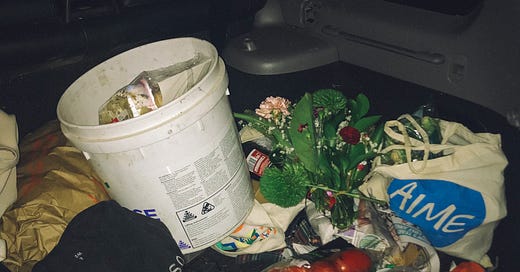Capitalism, food waste, and how to avoid bin juice
The practice and politics of dumpster diving
Why capitalism creates food waste
I’m not saying that nothing good has ever come out of capitalism, because I have just enjoyed a lot of Easter chocolate, and I definitely have capitalism to thank for that.
But one of the downsides of capitalism’s search for efficiency and profit maximisation is that that food becomes a commodity for profit, not an important resource and a human right.
Long story short: If it doesn’t make money, we bin it.
To be fair, perhaps capitalism isn’t entirely to blame. I’ve seen it reported that Australian households waste a shopping bag a week of food - that’s a lot! (And I’ll write on ideas to address this one day, I’m sure.)
However... it’s estimated that at least half of our food waste has hit the bin before it even makes it to households. That means it’s either not making it from the farm to retail (because it’ too big, or too small, or not symmetrical enough), or because it’s not sold before it is spoiled and is therefore chucked out into skip bins by retailers themselves.
This is certainly a pervasive problem, and there is already much being done. There are individuals, community organisations and businesses committed to reducing their food waste, and the Australian Government has recently introduced a national food waste strategy which is nice (it’s dated 2017, but I would have guessed 2003 from the Microsoft Publisher-esque front page. RIP Microsoft Publisher.).
I would love to have the power to implement some large scale change; maybe have a chit chat to the CEO of Woolworths or Westfarmers about what they can do to take responsibility for their waste. But while I’m waiting for Brad Banducci to give me a call, I’ve got to thinking about some more practical, everyday solutions to this political problem.
One of those solutions: Get into those bins and rescue that food.
Dumpster diving?!?!
Dumpster diving is definitely not my original idea. I know many of my friends regularly do a little bit of ‘shopping’ in their local supermarket dumpsters, but so far I hadn’t been free when they were going, or to be quite honest, just hadn’t been able to stay awake long enough to hit the dumpsters after dark.
With a lot of our friends away for New Year this year, my partner and I found ourselves hanging out with just the two of us on New Year’s Eve. Keen to stay up and watch the fireworks, but skeptical about our ability to stay awake for that long without something seriously exciting to keep us going, we decided that a tour of our local skip bins was on the agenda.
One of the biggest barriers to us starting our adventures in bin food, was that we just didn’t know what to do! It sounds easy enough, just get in the bin and try to find some food.. But what do we do if someone gets annoyed at us? How do we stay safe and not end up locked in the bin? How do we know what to take and what to leave?
A few hours on YouTube and r/DumpsterDiving got us where we needed to be. While we’re nowhere near experts, I thought there was still some value in sharing the beginner-level advice that made me feel confident enough to get started:
Advice for dumpster diving success:
Be aware of the local laws in your area. (I feel like I should say that.. to be honest I googled the laws, it all seemed very ambiguous, and decided I didn’t really care anyway.)
What I do care about though, is being as respectful as possible while going through someone’s skip bins. Done right, it should be a win for everyone - free food for you, reduced waste removal fees for the supermarket without them even realising it. As a general rule, don’t jump any fences, don’t break any locks, and leave things nice and neat, and with the skip lid closed! If someone is bothered and asks you to leave, politely pack up, apologise and move on. It’s a good idea to wait until the shops are closed and the staff have gone home. It helps them and you to feel more safe.
Safety first! Stick together, don’t shut the bin lid on your friends, and read tip number 4.
Pack some helpful items. We brought along gloves (essential for getting through without bin juice on your hands), a head torch, some work boots (or gumboots would work) and some plastic crates and buckets for collecting the goods (great because you can hose out that bin juice at the end). I know some people bring along a step stool and a rake to help minimise the parkour required to access the bins. I have the advantage of being an able bodied, rock climbing obsessed 27 year old, so I just jumped in. Next time, I’d wear a hat to avoid that hair to bin contact. It was nothing a shower couldn’t fix afterwards, but next time I’d seriously just wear a hat.
What to take and what to leave? Honestly, it’s a bit up to personal preference. Some people don’t touch the fresh stuff at all and stick to things in date and in sealed plastic packaging. Fair enough. We went a little further, and took any loose firm veggies (like carrots and potatoes), and other fruits and veggies that were in good condition and in some kind of packaging. Except melons. I read somewhere that melons skins absorb bad bin toxins and while it could be utter rubbish (lol), I wasn’t up for risking it. We took some things that were out of date but still looked good to eat too. And we took a LOT of hot cross buns, which the supermarket had obviously thought would be a good idea to bake the week after Christmas, but then no-one actually bought them. For some reason, folks must not have been in the mood for Easter back in December?
What to do with that food once you get home? We popped everything in sealed plastic packaging into the bath to rinse off the outside and then dried it off with a tea towel and popped it away into the fridge, pantry or freezer. The fresh stuff that wasn’t in packaging (like potatoes and carrots, and the fruits and veggies that were in plastic but with those little air holes, we soaked for 20 mins in the sink which we filled with 1 part vinegar to 2 parts water. After soaking we rinsed them with fresh water, dried them and then popped them into the fridge. I’ve been at it for a few months as I’m writing this, and I haven’t been stuck down by any mystery bin-borne illnesses yet - so I’m going to say that these strategies worked well enough!
Top tips from two Sarahs
Incidentally, both of the more experienced dumpster divers in my life are called Sarah. So here’s what the Sarah’s had to say when I asked them for their expert advice:
Sarah said:
Bring scissors!
Then, have one person outside the bin and one person inside. The person outside the bin can use the scissors to open packets and punnets of fruit, and sort the good from the bad there on the spot. Less sorting at home, and you can make use of the conveniently large skip bin right in front of you for all the bad stuff.
And the other Sarah said:
Get a milk crate to use as a step stool, then flip it over to carry your haul when you’re done!
Only take what you can use or give away - leave some food for others who might come past the bin that night.
Don’t be scared to go to a dumpster that already has people searching through it. People are usually friendly and want to connect over the cause of rescuing food.
If you take meat or dairy, make sure it’s cold to the touch. If it’s not, don’t take it.
Don’t get in any bins you’re not sure you can get out of.
If rescuing food from the dumpster as a response to the problem of food waste is something that aligns with your values, I hope that this has given you the information and excitement you need to get started!
If you’ve had your own experiences with dumpster diving, I’d love to hear your top tips in the comments! Or if you haven’t been before but would like to, what do you think stops you?
Privilege and politics
I have the privilege of enjoying dumpster diving as a fun adventure in practical politics. But not everyone does, and I don’t think this should be the solution that this country offers for those of us facing food insecurity. There are other options for food relief in Australia, most of which are run by members of the community. OzHarvest has a food relief search, and Ask Izzy has a search function for food relief and other supports.
And as always, this is not how you should live your life, but how you could live your life.
So please, take what’s helpful and leave what isn’t. (Come to think of it, this is a good motto for dumpster diving too.)






